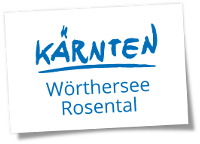-
-
Velden am Wörthersee Wintermärchen in der Westbucht -
Do you know Brahms?
Johannes Brahms actually only wanted to stay for one day when he got off the southern train in the then fishing village of Pörtschach in 1877. Then he liked it so much that the day turned into a whole summer, which was to be followed by two more summers. Pörtschach was just on the verge of becoming one of the most fashionable health resorts of the monarchy, where the upper middle-class public was having a rendezvous with a colorful crowd of artists. "It is lovely here, lake, forest, blue mountain bows above, shimmering white in the pure snow, crayfish abound," Brahms enthused in a letter. The then 44-year-old composer was already at the height of his fame. He first moved into a cheap janitor's apartment in Leonstain Castle, but in the following two years he fled from the persecutions of annoying groupies to the Krainerhäuschen across the street, where he rented an entire floor. The fact that he went swimming in the lake at the crack of dawn, even naked, caused an uproar among the locals. Breakfast around five o'clock. After a morning hike was already composed from seven o'clock. Afterwards, lunch at the Weißes Rössl inn, where correspondence was taken care of. In the evening he had local potentates sing Carinthian folk songs to him. The atmosphere must have been very inspiring, because the three summers at Lake Wörthersee are among the most fruitful in Brahms's oeuvre. He composed almost all of his works from Opus 73 to 79 in Pörtschach. His friend Theodor Billroth raved about the 2nd Symphony written here: "It's all blue sky, trickling springs, sunshine and cool, green shade!"
The International Johannes Brahms Competition
-
© (c) Arnold Pöschl
Waltraud Arnold stands in her tiptop rose garden and apologizes for its neglect. The competition has left her a bit behind, she says. For more than 20 years, the petite, retired English teacher has been responsible for the International Johannes Brahms Competition, which brings hundreds of highly talented young musicians from all over the world to Pörtschach every year. In public concerts, they face a top-class jury, which spontaneously judges in public. "The audience feverishly joins in from the first round and also sometimes reacts with a boo if the jurors judge differently than desired," says music lover Arnold. Some Pörtschach prize winners, such as Russian violinist Patricia Kopatchinskaja, have gone on to have world careers. A prize at the Brahms Competition looks good in a musician's biography.
Johannes Brahms, a Viennese by choice from Hamburg, liked to spend his summer holidays in Austria: in Gmunden, Mürzzuschlag and in Pörtschach. And while there is a Brahms collection in Gmunden and even an entire Brahms museum in Mürzzuschlag, all traces have been removed in Pörtschach for lack of interest. On the other hand, the top-class competition radiates worldwide. "I think we are better known internationally than in Pörtschach itself," Waltraud Arnold suspects. But that's her own fault, she remarks with her characteristic modesty: "I'm rather shy and don't like to put myself in the limelight." Showing off is not really her thing. Something terrible happened at the 2021 competition, she says. The deputy governor of Carinthia suddenly stood on the stage and, together with the mayor, awarded her the Golden Badge of Honor of the State of Carinthia. One takes the fright from her. "I'd rather we got a bit more money for the competition instead," adds the native of Leoben. She and her small team have always worked on a voluntary basis for young musicians, accompanied by a chronic lack of space and budget and a lack of cultural understanding. It is quite different in Japan or Korea: there, the prize winners of the Pörtschach Brahms Competition make it into the national TV news. It is also a Japanese music lover who invites the prize winners to an annual concert in the famous Suntory Hall in Tokyo. The same benefactor would even have financed a Brahms museum in Pörtschach, in the building where the composer rented in 1878. The finished concept failed first because of the Pörtschach municipal council and then because of a well-known arms manufacturer who bought the house at a higher price and had it demolished. Even the Japanese's generous offer to build a concert hall on Pörtschach's Wahliß meadow on the shores of Lake Wörthersee has so far gone unheeded.
"I used to give guided tours of the Brahms sites in Pörtschach," says Waltraud Arnold, "but now there is nothing to see." On the site of the demolished Krainerhäuschen, which was inhabited by Brahms, there is now a parking lot called "Brahms Parking." You have to have that kind of chutzpah. And the historic "Weiße Rössl", where the composer loved to stay, was demolished by the investor and another apartment complex was built in its place. Only in Leonstain Castle is there a bust of Brahms. And on the Hohe Gloriette, a lookout, you can hear Brahms music at the push of a button. The only thing that keeps Johannes Brahms alive here is the Brahms Competition. And this depends to a large extent on the person of Waltraud Arnold. She does not know what will happen to the competition if she is no longer able to perform. She hopes for a rejuvenation or a miracle. It would be a shame if nothing more remained of Brahms in Pörtschach than a parking lot of the same name.



